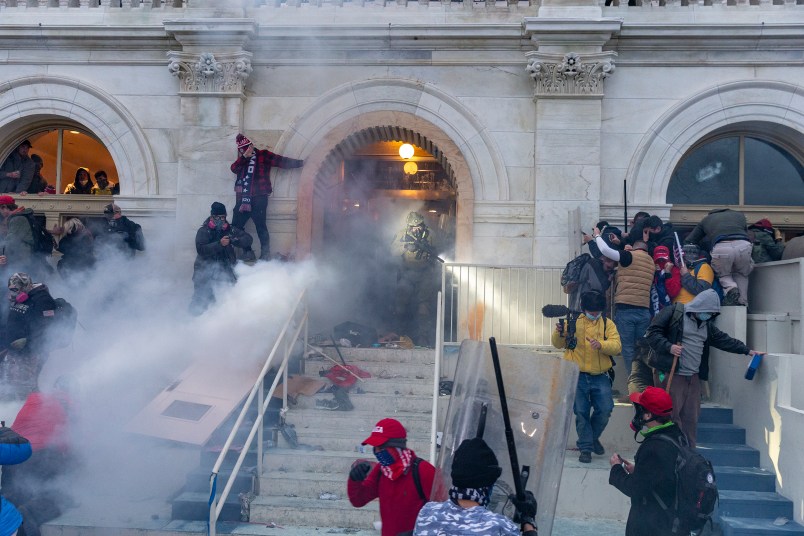The failure of the Senate to convict Donald Trump for inciting the Jan. 6 Capitol insurrection means he can’t be held accountable for it in any way, the former president argued in a Monday court filing.
Rep. Eric Swalwell (D-CA) sued Trump, Don Jr., Rudy Giuliani, and Rep. Mo Brooks (R-AL) over the insurrection attempt, saying that they violated laws against placing public officials in danger.
Trump replied for the first time in the case on Monday, saying that “a trial already occurred on Representative Swalwell’s allegations.”
“The Senate acquitted former President Trump,” the filing reads. “Undoubtedly, Plaintiff was disappointed with that result, but it does not give him a second bite at the apple to relitigate the issues here.”
Swalwell alleged in the lawsuit that Trump incited the insurrection during his months-long campaign to overturn the results of the 2020 election, and did so specifically during the Jan. 6 rally at the ellipse.
That, Swalwell said, placed the lives of numerous public officials in danger, and also constituted violations of D.C. law that include aiding and abetting a riot.
Trump hearkened back in the filing to the kind of standard response that he would use for any attempt at accountability during his presidency, describing those efforts as either harassment or witch hunts.
In this case, Swalwell’s suit is “abuse of the legal system and an improper attempt to harass and malign a political opponent and his son.”
The court, located in D.C., is being asked, Trump said, “to wade into turbulent political waters to decide what controversial speech should be favored.” The filing marks one of the first times that Trump has addressed the consequences of Jan. 6 — a “turbulent” political event, no doubt — in court.
Trump argued that in addition to being acquitted at the February impeachment trial, during which seven Republican senators broke ranks to vote for his conviction, his status as former president rendered him immune from liability, civil or criminal.
The acts he took to promote the myth that the election was stolen and that people should march to the Capitol on Jan. 6 were all within the scope of his official duties as president, Trump’s attorneys argued.
“It is well recognized that rousing and controversial speeches are a key function
of the presidency,” Jessee Binnall, an attorney for Trump, wrote in the filing. “That is especially true when, as is the case here, the President is advocating for or against congressional action.”
Trump also said that debates over whether Trump was culpable for the mayhem on Jan. 6 is really all just a question of politics, and that anything that the then-president said or did was protected by freedom of speech.
“As previously discussed, such value determinations are not of the type
appropriate for the judiciary,” the filing reads. “Instead, such questions are solely left to the discretion of the political branches.”
“Representative Swalwell and his collaborators had a full and fair opportunity to make their case at impeachment,” Trump argued. “They failed.”
Trump also included a swipe at Senate Minority Leader Mitch McConnell (R-KY), who voted to acquit Trump at the impeachment trial but also noted at the time that he was culpable for the insurrection.
“Those politicians lacked any direct knowledge of any relevant facts,” Trump argued, before name-checking McConnell and Sen. John Thune (R-SD), describing them as “politicians who speculated former President Trump was involved in some conspiracy.”







“Who you going to believe, me or your own lying eyes?”
“D” is for desperate. Also for demented. Also for deplorable. Also for dumb ass.
HAHAHAHAHAHAHAHAHAHAHAHAHAHAHAHAHAHAHAHAHAHAHAHAHAHAHA!!!
Nice try, dipshit.
More bad faith lack of candor towards the tribunal and nonsense “legal” arguments which will go unpunished by the relevant corrupted Board of Bar Overseers.
Trump’s lawyers aren’t saying he didn’t do it, just that trying him again in a court of law (rather than the political circus of an impeachment trial) would be double jeopardy.
A specious legal argument. Sure sounds like a confession to me.